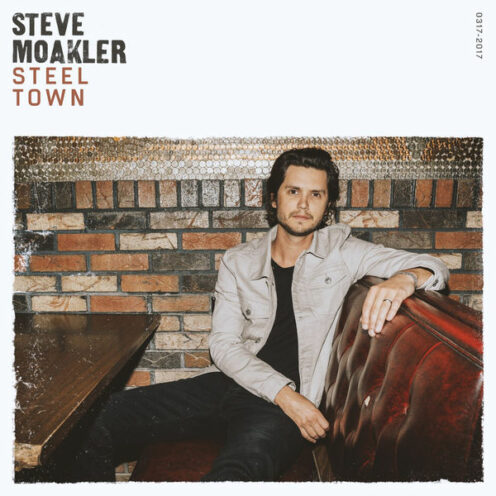
Steve Moakler’s biggest claim to fame—at least at this particular moment in time—is writing the title track and fifth single from Dierks Bentley’s 2014 LP, Riser. That fact may just change with Steel Town, Moakler’s fourth full-length solo record and his most accomplished work yet. Stacked with radio-friendly numbers that meld Moakler’s smart, resonant songwriting with the hooks and lush instrumentation of a mainstream country record, Steel Town has the potential to make Moakler into this year’s breakout country star.
Steel Town is 11 songs long, but Moakler actually released the first half of the record a year ago. In a move that has become customary for Nashville up-and-comers, Moakler dropped a self-titled EP last spring that featured the first five tracks from this album. (Similar maneuvers have recently helped launch artists like Maren Morris, Brett Young, and William Michael Morgan toward chart success.) That EP was my favorite short-form release of 2016, pairing wistful, emotional tour de forces (“Steel Town,” which Moakler wrote about the town where he grew up) with breezy summertime hooks (the indelible “Suitcase”) and gorgeous dusky ballads (“Summer Without Her”).
On Steel Town, Moakler stacks the five tracks from his 2016 EP (“Steel Town,” “Suitcase,” “Jealous Girl,” “Summer Without Her,” and “Love Drunk”) up front, in the same order that they appeared a year ago. Luckily, those five songs hold up so well—and work so seamlessly sequenced one after another—that even listeners who have played the EP to death shouldn’t mind revisiting them here. “Steel Town” is obviously the record’s mission statement, providing a lovely tribute to hometowns everywhere and how “you can leave, but your heart will hang around.” “Suitcase,” meanwhile, should have been one of the songs of the summer last year, with the kind of memorable, feel-good hook that can appeal to country listeners and pop listeners alike. Hopefully, country radio will wise up and start playing the track this time around.
If not, the rest of the record provides plenty of opportunities for airplay. Steel Town is a breezy, fun, feel-good record—the kind of album where every song could be the single. Even the break-up songs—the aforementioned cigarette lighter jam “Summer Without Her,” or “Hearts Don’t Break That Way,” with its infectious call-and-response backing vocals—are more likely to inspire a euphoric concert sing-along than they are to soundtrack a good cry. When Moakler turns in a track that is actually meant to be fun, meanwhile—like the hand-clapping “Love Drunk” or the riotous “Siddle’s Saloon,” which has some shades of Springsteen in its bar-band rock ‘n’ roll DNA—it’s almost impossible not to want to grab a beer and celebrate.
With country music giant Luke Laird behind the boards, it makes sense that Steel Town is Moakler’s most mainstream-leaning record yet. Moakler’s earlier records were pop singer/songwriter fare, more along the lines of Matt Nathanson than Dierks Bentley. His last full-length, 2014’s splendid Wide Open, definitely had a strong Nashville lean, but also had shades of folk and pop, and left some of the roughness around the edges of his sound. With Laird on board, Steel Town finds Moakler sounding smoother, cleaner, and more streamlined. Like Kacey Musgraves’ 2015 LP Pageant Material—which Laird also co-produced—Steel Town goes down nice and easy.
But Moakler has a lot more in common with Musgraves than just a producer and co-writer. Both artists write songs that are almost swoon-worthy in their melodic beauty (see the aching “Just Long Enough,” this record’s sterling penultimate track), but that can also make you think with their unique and deeply-felt lyricism. The clearest indication of that on Moakler’s record is lead single “Wheels,” which folds layer upon layer of meaning into that single titular word. In the chorus, wheels are a metaphor for the ever-accelerating forward motion of life. In the verses, though, Moakler deftly travels through life’s timeline, looking at what a set of wheels can mean at different moments of our lives. One moment, they’re the wheels on your first bicycle or car, and all the freedom that represents. The next moment, they’re the wheels on a suitcase, “headed home ‘cause mom says he ain’t got much more time.” Like John Mayer’s “Stop This Train,” a similarly structured song about growing up and getting older, “Wheels” is a surprising gut-punch and an absolute masterclass in songwriting.
The rest of Steel Town is similarly lived-in. The catchy hooks and smooth, glossy production can occasionally make it sound like the record was built for the radio, but in reality, it was built for the heart. Take “Just Long Enough,” which beautifully slow-dances through a series of memories about young love, each holding more gravity and emotion than the last: stolen moments in the car with your crush, a romantic song playing on the radio; the risk of smoking a cigarette you weren’t supposed to have; a cruise down a back road late at night, knowing full well that you’re long pas curfew; the leaves turning red at the end of the summer, when one of you had to leave town for good. “There’s days that come and go and you never think about ‘em again/But there’s the ones that wake you up and take you back,” Moakler sings on the bridge. Those days—the ones that “wake you up and take you back”—are the ones that give these songs their beautiful, universal truths. Even if Steel Town doesn’t make Moakler a star, his ability to tap into such universal human emotions is bound to win him plenty of admirers—whether among music listeners across the country or Nashville artists looking for their next ace-in-the-hole co-writer.